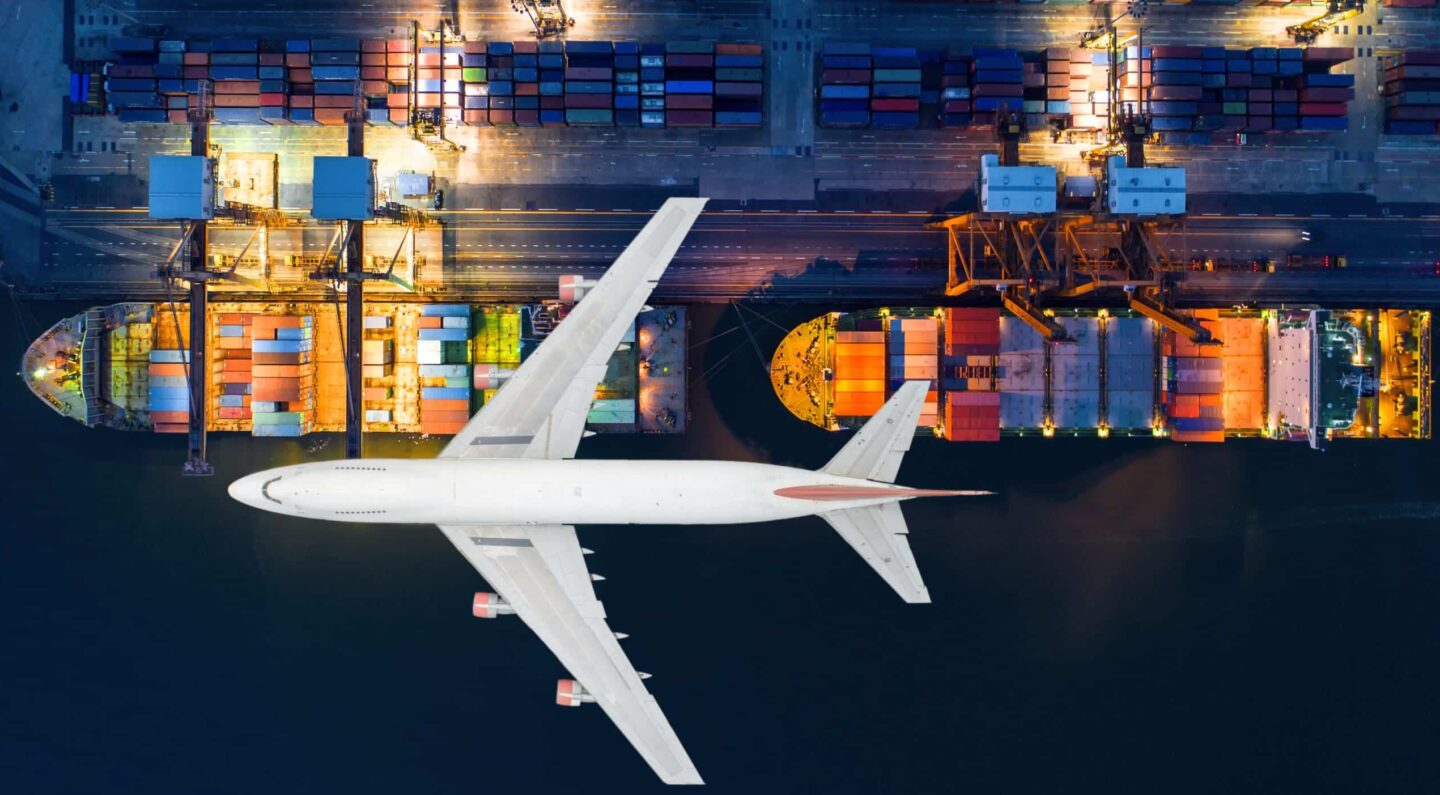
Fast, reliable shipping – how air freight works
Air freight refers to the transportation of goods via an air carrier, which may be commercial or charter.
This type of freight is a critical component of global logistics, enabling rapid, reliable delivery of high-value, time-sensitive products across extensive distances. Characterized by its speed and efficiency, air freight is preferred for transporting electronics, pharmaceuticals, perishable items, and other goods where time is of the essence.
Despite accounting for a small fraction of total freight volume by weight, the significance of international air freight in supporting international trade, e-commerce, and urgent supply chain needs is unparalleled.
The air freight process
The process involves several key steps, ensuring the efficient and safe transportation of goods from origin to destination. Here’s a brief overview:
- Booking and Documentation: The shipper or a freight forwarder books space on an aircraft and prepares necessary documents, including the air waybill, commercial invoice, packing list, and any special handling instructions.
- Cargo Handling and Inspection: The cargo is delivered to the air cargo terminal, where it undergoes security screening, inspection, and, if necessary, repackaging to meet air transport standards.
- Loading and Transportation to Aircraft: Once cleared, cargo is packed in Unit Load Devices (ULDs), such as pallets or containers, then moved to the aircraft for loading. Special equipment is used for oversized or heavy items.
- In-Flight and Transit: During flight, cargo is secured and monitored. If the shipment requires transfers, handling and customs procedures are managed at each transit point.
- Arrival and Customs Clearance: Upon arrival at the destination airport, cargo undergoes customs clearance, where documents are verified, and any duties or taxes are paid.
- Delivery to Final Destination: After clearance, the cargo is ready for pickup by the consignee or delivery to the final destination by ground transportation.
Types of air freight shipments
Air freight shipments can be categorized into several types, each serving specific needs and purposes in the logistics chain. Understanding these types can help businesses choose the most suitable option for their cargo:
- General Cargo: This category includes a wide range of goods that do not require special handling or conditions, such as machinery, electronics, and clothing. It’s the most common type of air freight.
- Perishable Cargo: Items that have a limited shelf life, such as fruits, vegetables, flowers, and some pharmaceuticals. These goods require temperature-controlled logistics to maintain their quality during transit.
- Dangerous Goods: Items that are hazardous and require special handling and packaging to ensure safety during transportation. This includes flammable, toxic, corrosive, or explosive materials.
- Valuable Cargo: High-value items such as jewelry, precious metals, and banknotes. These shipments are usually subject to strict security measures.
- Oversized and Heavy Cargo: Goods that exceed standard size or weight limits, such as industrial machinery, vehicle parts, and aerospace components. Special arrangements are necessary for their transport.
- Live Animals: Transportation of pets, livestock, and exotic animals with special care for their health, safety, and comfort during the flight.
Benefits of air freight
The benefits are manifold and make it a preferred choice for many businesses. Here are some of the key advantages:
- Speed: Air freight is by far the fastest mode of transportation, allowing goods to reach their destination in a matter of hours or days.
- Reliability: With fewer weather-related delays and better tracking systems, air freight offers higher reliability than other modes of transport.
- Global Reach: Airports connect major cities worldwide, making air freight an excellent choice for international trade and cross-border shipments.
- High Security: Air cargo terminals have stringent security standards in place, ensuring the safety of goods during transit.
- Reduced Inventory Costs: The speed of air freight reduces inventory costs by reducing storage time and eliminating stock-outs.
- Flexibility: Air freight offers flexibility in terms of timing, route, and capacity. It allows for last-minute changes and urgent deliveries.
Emerging trends
The air freight industry is on a trajectory of significant growth, propelled by the escalating demand for transporting electronics, pharmaceuticals, and perishable items. This surge is further augmented by technological innovations and the broadening scope of international commerce, indicating a robust future for air logistics.
The transition towards e-commerce, coupled with advancements in freight technology and a growing emphasis on sustainability and cybersecurity, are shaping the industry’s evolution. These trends not only enhance operational efficiency but also contribute to the sector’s adaptability in a rapidly changing global market.
Moreover, the increasing reliance on shipping freight internationally underscores the vital role of air freight in connecting global markets and facilitating international trade. In contrast to air freight’s rapid delivery times, ocean freight offers a cost-effective solution for less time-sensitive freight, handling a significant volume of global trade with its capability to transport large quantities of goods.
Consumer demand for speed and reliability in air freight shipping
Consumers’ expectations are higher than ever in the digital age, with a strong preference for rapid and reliable deliveries. This is particularly evident in the realm of e-commerce, where efficiency can be a significant competitive advantage. Responding to these expectations, the air freight sector is innovating to offer quicker delivery solutions while maintaining the integrity and timeliness of shipments. Such responsiveness is crucial in meeting today’s demand for immediate gratification and plays a vital role in customer satisfaction and loyalty.
Overcoming air transportation regulatory challenges
The industry is not without its challenges, facing pressures from rising fuel costs, stringent regulatory requirements on cargo movement, and intensified competition from alternative transport modes.
A notable regulatory challenge is the Pre-Loading Advance Cargo Information (PLACI) program, which mandates the submission of detailed cargo data before loading, aiming to enhance security measures. Additionally, navigating customs clearance processes has become increasingly complex, requiring meticulous attention to ensure compliance and avoid delays.These challenges necessitate a delicate balance between compliance, operational efficiency, and cost management to maintain competitiveness and ensure smooth global trade flows.
Air freight rates and cost factors
The cost of air cargo freight has witnessed a notable increase, with current rates increasing due to higher demand, marking a significant surge from pre-pandemic figures. Rates vary widely depending upon the lane and associated capacity. These rates are influenced by various factors, including the distance of the shipment, cargo size and type, and the intricacies of route planning. Understanding these pricing dynamics is essential for businesses and logistics partners to strategize effectively and optimize their shipping operations.
Using a freight forwarder can significantly streamline the process of shipping goods by air, offering expertise in route optimization, cargo consolidation, and negotiation of competitive air freight rates. They also assist with the necessary documentation and procedures for international freight, including customs clearance, making them indispensable for businesses involved in global trade.
The future of air freight
Valued at USD 66.6 billion in 2021, the global air transport market is anticipated to reach USD 133.47 billion by 2030. Despite accounting for a mere fraction of total freight activities by weight, the sector’s contribution to transporting critical goods swiftly is unmatched. Technological innovations, such as cool-chain systems and automation, are pivotal in driving growth, despite the challenges posed by the COVID-19 pandemic.
As the industry navigates through this transformative phase, stakeholders must remain informed and adaptable, embracing technological advancements and innovative practices to overcome obstacles and seize emerging opportunities.
Air freight solutions with Uber Freight
Uber Freight is your partner in navigating the complexities of the logistics world, ensuring your cargo reaches its destination efficiently and reliably. Our tech-enabled Ocean and Air services are backed by the unrivaled combination of innovative global transportation management technology and dedicated team of domain experts and data scientists. We leverage our leading-edge technology to provide shippers with a holistic view of their international freight. Our international shipping services include:
- Global transportation management
- Freight forwarding
- Customs brokerage and compliance
- Ocean and air freight
- Technology integration
- Procurement and benchmarking
Our global transportation professionals can help you improve overall transportation efficiency, mitigate risks, and navigate cost reduction, landed cost analysis, tariff implications, customs duty and more. Connect with an expert today to get a quote or learn about our international shipping services.
FAQs
Why is air freight so expensive?
Air freight commands a higher price due to the exceptional speed and efficiency it offers for transporting goods. The costs cover a range of services including rapid transit times, airport security measures, and the handling of sensitive or perishable items, ensuring your cargo reaches its destination airport swiftly and in excellent condition.
What can be shipped by air freight?
Almost anything can be shipped via air freight, from electronics and pharmaceuticals to fashion items and perishable goods. Its versatility makes it ideal for high-value, time-sensitive, or urgent shipments, providing a reliable solution for a broad spectrum of shipping needs.
What is the advantage of air freight?
The primary advantage of air freight is its speed, allowing businesses to move goods quickly over great distances, which is crucial for time-sensitive shipments. Additionally, air shipping offers high levels of reliability and security, making it a preferred choice for transporting valuable or perishable items that require special handling.
How does freight travel on a plane?
Freight for air transportation is packed in Unit Load Devices (ULDs) such as pallets and containers for efficient loading and unloading, ensuring cargo safety during flights. Standardized since the late 1950s, ULDs are crucial in maintaining aircraft balance. The International Air Transport Association (IATA) regulates ULD use. Various ULD types cater to specific aircraft needs, with pallets like PMC, PAG, and PQA, and containers like LD3 and LD7. ULDs are loaded onto planes using K loaders equipped with lifting platforms and automated rollers for secure transport.


